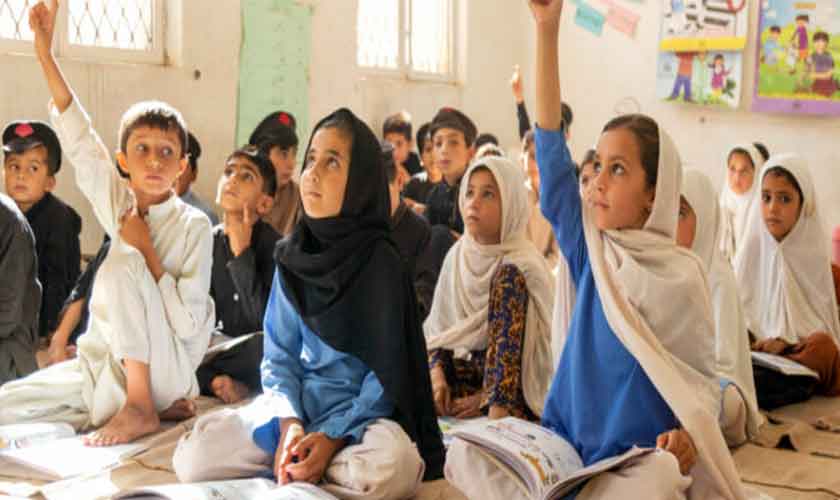Disclaimer: Website Under Maintenance: Our website is currently under maintenance. We apologize for any inconveniences.

As Pakistan prepares for general elections, it is imperative that the education agenda takes centre stage in the political discourse. For too long, education has been treated as a subject of marginal consequence. This neglect has resulted in an overwhelming population of young people who are illiterate and unskilled and, therefore, lack favourable prospects in the global market.
Education is a fundamental right and a key to promoting economic growth, fostering social cohesion and developing sustainable civilised societies. With more than seven decades of lag to catch up with, it is therefore high time that all political parties in Pakistan recognise the critical importance of education and make it a top priority in their election agendas.
In 2022, Pakistan marked its 75th anniversary. This year, the nation commemorated the 50th anniversary of the 1973 constitution. However, none of the governments have prioritised ensuring accessible and high-quality public education for all.
During Ayub Khan's regime, education was neglected in favour of economic growth. While some economic growth was achieved, it came at the cost of an underdeveloped education sector. Yahya Khan's rule did not witness any substantial reforms or public investment in education either. The Zia-era curriculum resulted in a decline in the quality of general education. Gen Musharraf's rule did see an increase in education financing, but it was mostly limited to higher education and compromised the expansion of the school education sector.
Civilian governments share equal responsibility in this regard. They have allocated a meagre average of 2.5 percent of the public expenditure to education despite various commitments to increase it to 4-6 percent of the GDP. The continuous neglect has resulted in a significant failure to address the educational requirements of millions of Pakistani children.
First and foremost, the manifestoes must acknowledge education as a matter of national security. A well-educated population is less susceptible to extremist ideologies and better equipped to make informed decisions. Good education is also a key to reducing income inequalities and boosting economic growth.
All political actors across Pakistan must clearly define immediate measures to bring the colossal number of 25 million out-of-school children into the realm of formal education. The political parties must pledge to introduce a comprehensive framework for an inclusive and globally compatible education system within the first hundred days of coming into power. Such a framework must offer concrete steps to make education accessible to girls; transgender persons; children with disabilities; and ethnic and religious minorities. The framework must also outline the measures that will be taken to enhance children's access to secondary level schools. This is currently the biggest leak in terms of school dropouts in Pakistan.
Political parties must not only commit to an inclusive approach but also provide a clear roadmap for enhancing and streamlining education financing. Moreover, they should pledge to safeguard educational policies from disruptions caused by political instability or changes in government.
Technical and financial support as well as sufficient autonomy must be extended to head teachers to develop and implement school-specific disaster response plans.
The oft-demanded strong interdepartmental and inter/intra-provincial coordination is key to the execution of such a preparedness and disaster-risk management component. The ministries and departments of education, planning and development, climate change and disaster management authorities must routinely exchange knowledge and information and evaluate progress against short-, medium- and long-term goals. These goals should be supported by adequate financial resources. Transparency and openness in all processes are key to a well-coordinated education response during emergencies.
Beyond emergencies, systemic changes must pave the way for a new generation of well-informed students who are aware of and able to take positive climate action. The most obvious step in this regard would be to introduce climate education in the school curricula at all levels.
Education sector plans developed by the provinces should include resilient education objectives along with implementation plans. The less obvious but equally important step is ensuring that every child receives the critical, potentially life-saving knowledge.
Special attention needs to be given to the most vulnerable groups, i.e., girls, children living with disabilities, transgender children and learners from other marginalised groups. The inclusive approach will in turn require support from the communities. Therefore, regular community engagement geared towards encouraging sustained education for all children of school-going age, especially the most vulnerable groups, is integral to any effort aimed at a shock-resilient education system.
Finally, parliamentary oversight is absolutely imperative to ensure uninterrupted and efficient implementation of policies as well as sufficient allocation of monetary resources. The latter is especially important since Pakistan's public investment in education is the lowest in South Asia.
It goes without saying that the best-laid plans cannot be executed if not backed by sufficient resource allocation. For this reason, when the state of Pakistan mobilises resources during and beyond emergencies, education needs to be prioritised at par with other developmental needs such as infrastructure.
Pakistan cannot rise above the multitude of challenges it faces today without a well-rounded, highly educated workforce. It is, therefore, time to stop making excuses and acknowledge that the dream of a strong Pakistan can only be realised through a resilient and inclusive system of education.
The writer is the executive director of the Society for Access to Quality Education (SAQE), the national coordinator for Pakistan Coalition for Education and a Malala Fund Education champion. She can be reached at [email protected] & on Twitter @zehra2576
Source: https://www.thenews.com.pk/tns/detail/1108271-putting-education-first